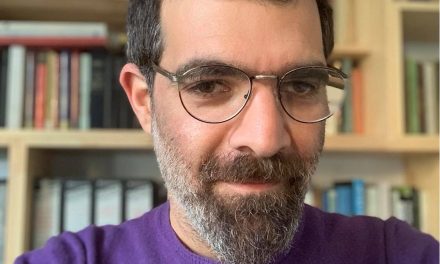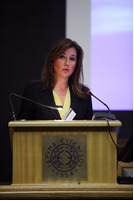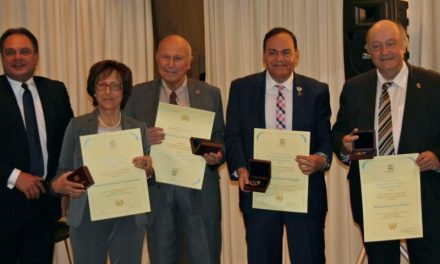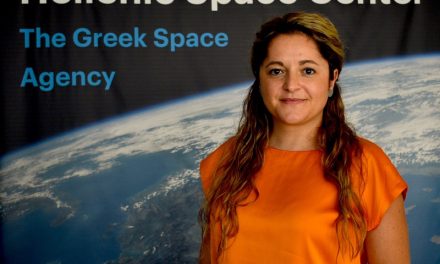Greek News Agenda presents Manos Hatzimalonas, founder of the Philotimo Foundation, an initiative aiming to define the unique concept of “philotimo”, currently without any direct literal translation from Greek into English or any other language. The international team of experts gathered around the “philotimo” initiative believe that the timing is right to engage in active dialogue around the meaning and social dynamic of philotimo for both Greeks and the global community, aiming to add it to the word’s dictionaries and encouraging its use in the international public sphere. Manos Hatzimalonas spoke to Greek News Agenda* about the initiative, giving us an insight on the issue.
You have a background in Psychology, specializing in personal and organizational applications of positive psychology. What motivated you to establish the Philotimo Foundation in 2014 and what does “philotimo” mean, in practical terms, for you and your work?
In recent years, psychology has taken a turn in exploring human potential away from psychopathology and towards the study of excellence and everyday performance, while rerouting its mission towards answering core philosophical questions concerning the “good life” and “good society”– or “good organizations” within which such good life is made possible. The Philotimo Foundation is an independent, non-profit social innovation center working since 2011 on the foundations of good citizenship from the very personal through to the institutional. The motivation for the initiative originated from the absence of systematic research around philotimo’s psychosocial dimensions, despite its centrality not only within Greek culture but also across western societies founded on the Hellenic ideals of the self and “the polis”. Since philotimo embodies the intersection of personal and societal values in society, it is a compass for both being and doing. Aside from the high sense of duty to do justice to a research task concerning the Greek nation’s most central narrative, a practical realization is that the more one studies it, the more one is moved to live in accordance with it. Living philotimously is having a more wholesome, non-judgmental yet fully engaged private and public life.
Philotimo Foundation focuses on defining the unique concept of “philotimo” which currently does not have any direct literal translation from Greek into English. The Foundation launched an international campaign to source contemporary definitions on the concept. How many people have taken part in the survey and what have the most common definitions of “philotimo” been so far?
We have collected over 2500 definitions and narratives from around the world across a variety of data, from long-form questionnaires to social media feeds. Philotimo consists of a complex array of constructs revolving prudence, temperance, fortitude and justice, but also faith, hope and charity. Although we are currently processing for deeper meaning analysis in the data, prevalent themes concern resilience and solidarity in the face of hardship and injustice. Especially important to note is that philotimo, at the intersection of private and public honour, takes on attributes of civic deviance and activism as a form of reaction to political corruption and the dilution of values in society. This observation is congruent with the notion of plasticity for philotimo as private and public character virtue. During times of war it was associated with confronting the enemy, whereas in current times of sociopolitical crises where the enemy is less defined, it takes on a more complex dimension. A detailed publication of our findings is due by the spring of 2016.
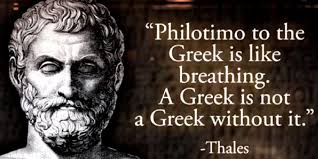 “Philotimo” is often considered to be the “secret” uniting all Greeks as suggested by the OXI Foundation and it is presented as the core cultural value encompassing all others, which could even be used by Greece as a public diplomacy tool. Do you believe that philotimo is strictly a Greek virtue or one that can be cultivated and taught in all societies?
“Philotimo” is often considered to be the “secret” uniting all Greeks as suggested by the OXI Foundation and it is presented as the core cultural value encompassing all others, which could even be used by Greece as a public diplomacy tool. Do you believe that philotimo is strictly a Greek virtue or one that can be cultivated and taught in all societies?
Adamantia Polis (1965) was the first prominent political science scholar to rightly ascribe such importance to philotimo for Modern Greek society. Departing from this, OXI Foundation created a powerful campaign which on the one side helped revive the awareness around the concept among Greeks, but in our opinion failed to capture its universal character and engage the non-Greek citizen. It certainly makes for a dynamic platform in the public diplomacy arena, but it needs fine-tuning if the world is ever to take notice. Through our campaign to popularize philotimo by adding it to the word’s dictionaries and encouraging its use in the international public sphere, we intend on raising awareness around its foundational value as a natural social contract while holding Greece in a positive light internationally.
As mentioned in the Philotimo Foundation website, it is your team’s belief that there was an identity crisis in Greece preceding the economic crisis. However, during the crisis, we have seen a lot of civil society initiatives (by NGOs, the church, the neighborhood, volunteer groups, etc). Do you believe that the crisis reawakened the “philotimo” of the Greek people?
Greeks have always been quick and effective at standing by their fellow humans in need. The needs of the present crisis, however, require systematic approaches and sustainable resourcefulness in addressing the need for proactive as well as reactive measures in dealing with a national crisis. Such measures concern the education of citizens from schooling through to senior generations and an independently steered political dialogue that dares to tackle the system’s fallacies at root. This is how people restore faith in the state and each other, and this is how a crisis turns from threat into opportunity.
Among the values attached to philotimo is solidarity, a word that has been at the epicenter of the public debate in the EU during the crisis. Do you believe that there can be genuine solidarity and philotimo in the political and economic sphere?
Never before has the call for solidarity on the political level been more relevant, never before has it been more hijacked by party politics on a national and European level. Ordinary citizens sense this and a call for solidarity against the problem becomes activism against those who refuse to engage in honest dialogue and seek solutions beyond political opportunism. The need for genuine solidarity and philotimo is very real. It is only a matter of time before societies self-organize to the extent of having the right leverage to press for the necessary change. Today more than ever, grass-roots socioeconomic movements are being enabled through technological and entrepreneurial innovation towards those ends.
#Philotimo Initiative
What are the aims, the vision of the Philotimo Foundation initiative for the future?
Our aims center around putting theory into practice by empowering the citizen through education and innovative interventions to make their lives and their communities more fulfilled, more sustainable, more just. Our micro-scholarship program offers 1000 and 12 months mentorship to materialize sustainable community projects that focus on doing exactly that. At the beginning of 2016, we also are announcing an ambitious program to create a non-political alternative ‘House of Representatives’ around the country consisted of people who are trusted by their communities and upon whom the nation can rely for guidance through difficult times.
*Interview by Eleftheria Spiliotakopoulou
See also: Searching for Philotimo
TAGS: GLOBAL GREEKS | GREEK LANGUAGE | INTERNATIONAL RELATIONS


